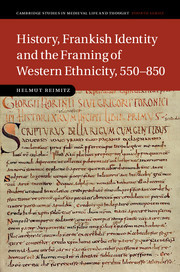Description
History, Frankish Identity and the Framing of Western Ethnicity, 550–850
Cambridge Studies in Medieval Life and Thought: Fourth Series
Author: Reimitz Helmut
This pioneering study explores medieval Frankish identity as a window into the formation of a distinct Western conception of ethnicity.
Language: English
Subject for History, Frankish Identity and the Framing of Western...:
Approximative price 147.50 €
In Print (Delivery period: 14 days).
Add to cart
History, Frankish Identity and the Framing of Western Ethnicity, 550-850
Publication date: 08-2015
Support: Print on demand
Publication date: 08-2015
Support: Print on demand
Approximative price 38.06 €
In Print (Delivery period: 14 days).
Add to cart
History, Frankish Identity and the Framing of Western Ethnicity, 550-850
Publication date: 04-2017
Support: Print on demand
Publication date: 04-2017
Support: Print on demand
Description
/li>Contents
/li>Biography
/li>
This pioneering study explores early medieval Frankish identity as a window into the formation of a distinct Western conception of ethnicity. Focusing on the turbulent and varied history of Frankish identity in Merovingian and Carolingian historiography, it offers a new basis for comparing the history of collective and ethnic identity in the Christian West with other contexts, especially the Islamic and Byzantine worlds. The tremendous political success of the Frankish kingdoms provided the medieval West with fundamental political, religious and social structures, including a change from the Roman perspective on ethnicity as the quality of the 'Other' to the Carolingian perception that a variety of Christian peoples were chosen by God to reign over the former Roman provinces. Interpreting identity as an open-ended process, Helmut Reimitz explores the role of Frankish identity in the multiple efforts through which societies tried to find order in the rapidly changing post-Roman world.
Introduction; Part I. Communities of the Middle Ground in Sixth-Century Gaul: 1. Gregory of Tours and his genealogy of pastoral power in late antique Gaul; 2. Virtutes sanctorum et strages gentium: 'The deeds of the saints and the slaughters of the peoples' - the radicalisation of church history; 3. The dangers of history; 4. Continuities and discontinuities: Roman and Frankish alternatives to Gregory; 5. The politics of identity in the Merovingian kingdoms of the sixth century; Part II. Countermyths: The Search for Origins in the Merovingian Kingdoms: 6. The persistence of Gregory's vision of community: the réécriture and reconfiguration of the Histories in the seventh century; 7. Iocundus in fabolis et strenuus in consiliis: Roman trickery and Frankish mythmaking in the Chronicle of Fredegar; 8. … sicut ceterae gentes - '… like the other peoples' - the Liber historiae Francorum and the definition of the populus in the seventh and eighth century; 9. Spielräume of Frankish identity in the long seventh century; Part III. A Common Future: The Reforms of Frankish Identity under the Carolingians: 10. Gens Francorum inclita: 'the illustrious Frankish people' - the centralisation of Frankishness under the early Carolingians; 11. Correctio: the redefinition of central Frankishness; 12. Before and after 800: central and local Frankishness in the Carolingian world; 13. Before and after 829: the transformation of Frankish identity from the short to the long history of the Royal Frankish Annals; Conclusion: Frankish identity, Western ethnicity; Bibliography; Index.
Helmut Reimitz is Professor of History at Princeton University, New Jersey and studies the history of the Early Middle Ages in Europe, focusing on the social and political transformations of the Latin West from the end of the Roman Empire to the Carolingian Empire (c.4th–10th centuries). Before joining Princeton University in September 2008, he was head of the Early Medieval Department at the Institute for Medieval Research, Austrian Academy of Sciences. He is a member of several international networks, such as the European Science Foundation Project on the 'Transformation of the Roman World', and 'Texts and Identities in the Early Middle Ages' (cooperation of the Universities of Cambridge, Sorbonne, Utrecht, Leeds and Vienna). He has published a number of volumes on the history of the early Middle Ages and its meaning for the history of Europe. His books include Cultures in Motion (with Dan Rodgers and Bhavani Raman, 2013), Vergangenheit und Vergegenwärtigung. Frühes Mittelalter und Europäische Erinnerungskultur (with Bernhard Zeller, 2009), Staat im frühen Mittelalter (with Stuart Airlie and Walter Pohl, 2006) and The Construction of Communities in the Early Middle Ages (with Richard Corradini and Max Diesenberger, 2003).
© 2024 LAVOISIER S.A.S.




